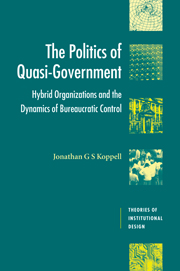Book contents
- Frontmatter
- Contents
- List of figures
- List of tables
- Acknowledgments
- List of acronyms
- 1 Introduction
- 2 Building a better model of bureaucratic control
- 3 Administration by regulation
- 4 Principal's preference, organizational structure and the likelihood of control
- 5 Hybrid organizations and the alignment of interests
- 6 The limits of congressional control: agent structure as constraint
- 7 Regulating hybrids: structure and control
- 8 Conclusion
- Appendix: background of organizations studied
- Interview subjects
- References
- Index
1 - Introduction
Published online by Cambridge University Press: 22 September 2009
- Frontmatter
- Contents
- List of figures
- List of tables
- Acknowledgments
- List of acronyms
- 1 Introduction
- 2 Building a better model of bureaucratic control
- 3 Administration by regulation
- 4 Principal's preference, organizational structure and the likelihood of control
- 5 Hybrid organizations and the alignment of interests
- 6 The limits of congressional control: agent structure as constraint
- 7 Regulating hybrids: structure and control
- 8 Conclusion
- Appendix: background of organizations studied
- Interview subjects
- References
- Index
Summary
In the aftermath of the attacks on the World Trade Center and the Pentagon, attention was focused on the failings of the private firms charged with securing America's aviation system. The low quality of airport security – a fact long known to frequent travelers in the United States – was suddenly an urgent concern. The Bush Administration quickly suggested that the government might assume responsibility for screening passengers and baggage, a function then performed by low-paid employees of private security firms hired by individual airlines (Schneider and Nakashima 2001).
This development was quite striking inasmuch as President George W. Bush followed in the tradition of Ronald Reagan, calling for a smaller federal government and increased responsibility for the private sector. What was not surprising, however, was that the general suggestion was soon followed by the proposal that a government corporation be created to handle the weighty task of hiring, training and managing the personnel charged with preventing another September 11.
Government corporations are a type of “hybrid” organization. The appeal of hybrids, entities that combine characteristics of public-and private-sector organizations, lies in the belief that they combine the best of both worlds: public accountability and private efficiency. Indeed, the General Accounting Office (GAO) expert testifying before Congress regarding his agency's survey of possible structures of the new security agency noted the general view “that the screening performance and accountability would improve under a government corporation” and such an entity would be “more flexible and less bureaucratic than a federal agency” (GAO 2001).
- Type
- Chapter
- Information
- The Politics of Quasi-GovernmentHybrid Organizations and the Dynamics of Bureaucratic Control, pp. 1 - 20Publisher: Cambridge University PressPrint publication year: 2003



